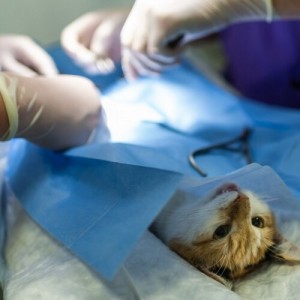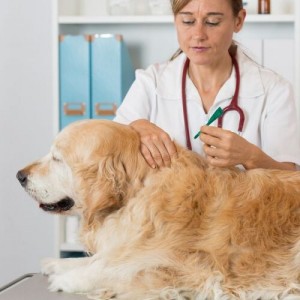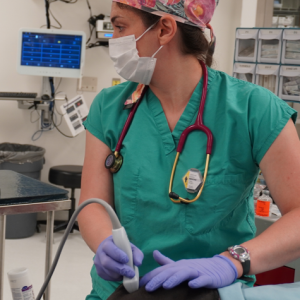Honey Bee Bonanza: NC State Vet Med Hosts National Consortium Conference
The NC State College of Veterinary Medicine played host for the Honey Bee Veterinary Consortium’s annual conference Oct. 1, welcoming more than 100 bee lovers to campus for lectures and hands-on labs.
Honeybees are essential to a third of the world’s food production and have been dying off across the globe in recent years because of poor nutrition due to land-use changes, pesticide exposure and introduced pests and diseases.
In 2017, the FDA declared honey bees as food animals and began requiring veterinary oversight of the antimicrobials used in treating them.
Since then, NC State has been at the forefront of protecting bees and equipping beekeepers and veterinarians with essential tools. A group of North Carolina veterinarians, mostly NC State faculty and graduates, started the Honey Bee Veterinary Consortium in 2016 to offer beekeepers a place to find veterinarians able to help them follow the coming FDA rules. The consortium now includes veterinary students and professionals from all segments of veterinary medicine and animal science who care about bees and beekeeping.
Lectures at the 2023 HBVC conference included “All About Queens” and “The Buzz on Bee Toxicology.” The event also offered two hands-on lab sessions: “Introduction to Hive Inspections” for beginners and “Honey Bee Anatomy and Diagnostics” for advanced attendees.
“The USDA has an excellent module on honey bees, so a lot of it fortunately I was like, ‘Oh, I already know some of this from reading about it,’ but there’s just no substitute for hands-on learning,” says Dr. Kelsey Walker, a faculty member at the University of Missouri College of Veterinary Medicine who made the trip to Raleigh for the event. “To be able to do this hands-on is amazing. I’m really grateful to NC State for hosting this.”
Walker says she is trying to get more of her veterinary students interested in learning about caring for bees.
“As veterinarians, we are now an integral part of this, but there are so few people willing to see bees,” she says. “It’s not something we spend a lot of time on curriculum with. So I’m trying to expand that at Mizzou.”
Last fall, the NC State College of Veterinary Medicine offered its students a chance to take a selective course in apiary work or honey bee keeping. The selective gave students crash courses in topics including bee anatomy and physiology, common diseases and pests, hive inspection techniques and bee sting therapy.
Training more veterinarians to help bees is critical to the survival of the at-risk insect, says Dr. Greg Lewbart, NC State professor of Aquatic, Wildlife and Zoological Medicine, who coordinated the selective. From April 2020 to April 2021, beekeepers across the United States lost 45.5% of their managed honeybee colonies, according to the Bee Informed Partnership.
This year’s honey bee conference also served as a continuing education event for practicing veterinarians, where NC State and its partners gave veterinarians with decades of experience a chance to learn the latest in bee care.
Dr. Pat Gorman, who received her DVM from NC State in its second class in 1986, is a small animal veterinarian in Pennsylvania who attended the conference because she wants to help her community with bees.
“This was very helpful today in building up confidence even on something as basic as making the smoker work, getting dressed in a beekeeper suit — things that you would be judged on your competence of,” Gorman says. “You can have a lot of book knowledge, but unless you know how to handle the tools, they’re not going to have confidence in what you’re saying.”
Gorman says she was most surprised to learn about all of the research going on regarding bees.
“I’ve learned this weekend how in-depth things are being studied,” she says. “It’s like, ‘Not only do we know why they dance, we know this, and these are the studies that are going on.’ And it seems like such a niche, but there are so many people really doing in-depth and important investigations on bees.”
For Walker, her takeaway is more of a self-revelation.
“The most surprising thing I’ve learned is that I can handle bees,” she says. “I grew up phobic of bees and all of the flying things, so this is a huge step forward for me, to actually hold a frame with all of the bees. So I’ve learned about me more than anything.”
Author: Burgetta Eplin Wheeler
Source: https://news.cvm.ncsu.edu/








List
Add
Please enter a comment